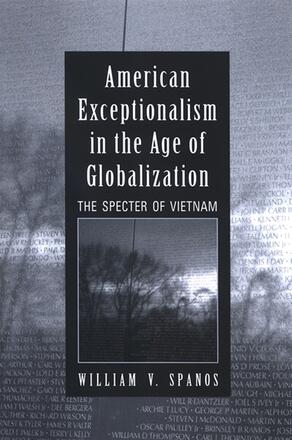
American Exceptionalism in the Age of Globalization
The Specter of Vietnam
Alternative formats available from:
Connects the American exceptionalist ethos to the violence in Vietnam and the Middle East.
Description
In American Exceptionalism in the Age of Globalization, William V. Spanos explores three writers—Graham Greene, Philip Caputo, and Tim O'Brien—whose work devastatingly critiques the U. S. intervention in Vietnam and exposes the brutality of the Vietnam War. Utilizing poststructuralist theory, particularly that of Heidegger, Althusser, Foucault, and Said, Spanos argues that the Vietnam War disclosed the dark underside of the American exceptionalist ethos and, in so doing, speaks directly to America's war on terror in the aftermath of 9/11. To support this argument, Spanos undertakes close readings of Greene's The Quiet American, Caputo's A Rumor of War, and O'Brien's Going After Cacciato, all of which bear witness to the self-destruction of American exceptionalism. Spanos retrieves the spectral witness that has been suppressed since the war, but that now, in the wake of the quagmire in Iraq, has returned to haunt America's post-9/11 "project for the new American century. "
William V. Spanos is Distinguished Professor of English at Binghamton University, State University of New York. He is the author of many books, including America's Shadow: An Anatomy of Empire and Heidegger and Criticism: Retrieving the Cultural Politics of Destruction.
Reviews
"The writers William V. Spanos chooses to study in American Exceptionalism in the Age of Globalization … are noteworthy today for characterizing the U. S. intervention as a darkly brutal affair. " — American Literary Scholarship
"In this fascinating and important book, distinguished scholar William V. Spanos uses his Heideggerian perspective to explain why we Americans have suppressed memory of the catastrophe of Vietnam and why we are now in the midst of repeating that error in a new form in Iraq. Spanos explains how American exceptionalism led us as a nation to believe that we had an 'errand in the wilderness' and a manifest destiny to take over the continent, and, more recently, to believe that it is our calling to 'bring Western-style democracy to the world. '" — J. Hillis Miller, author of Literature as Conduct: Speech Acts in Henry James
"This book will become an important voice in the ongoing debate about American identity and the United States' place in the world of the twenty-first century. " — Rodney Mader, West Chester University of Pennsylvania